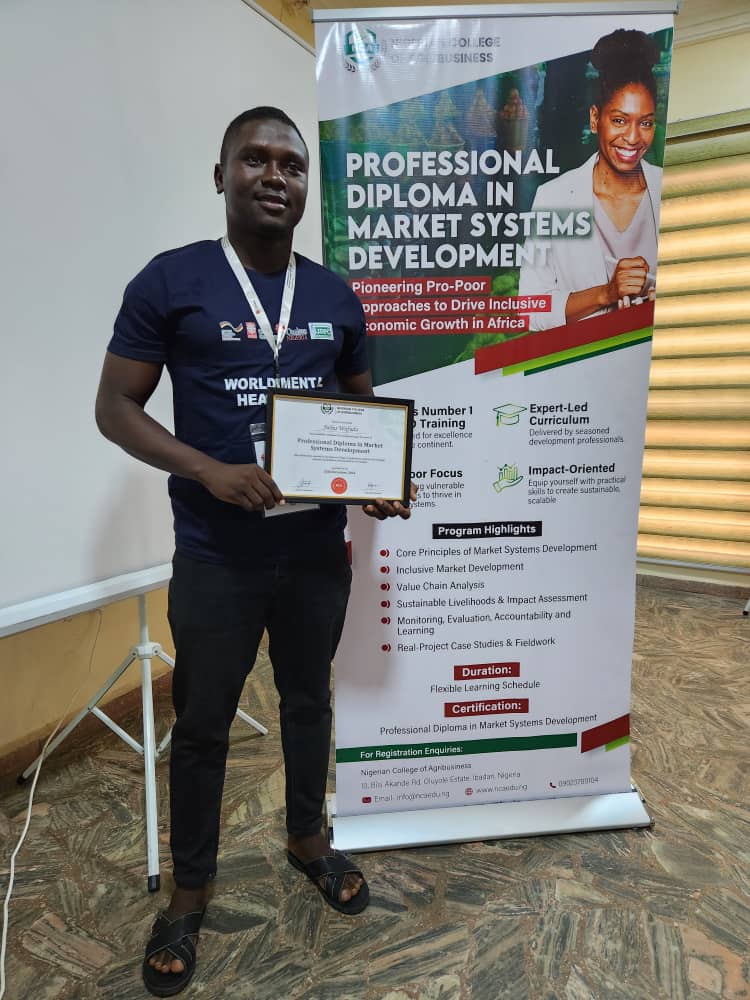Start Dates
Duration
Fees
Learning Activities
In a world where data-driven decisions are transforming industries, the ability to leverage business analytics in the food and agriculture sector is crucial for success. There is a growing global need for qualified business analytics professionals who can leverage data to improve business processes, enhance competitiveness, and drive sustainable growth.
The Professional Diploma in Business Analytics for Food and Agriculture is designed to equip you with the analytical skills and knowledge to navigate the complexities of modern operations, optimize operations, and drive sustainable growth in the food and agriculture sectors.
The program offers an immersive, fully online experience that empowers you to drive innovation and efficiency in the dynamic world of food and agriculture through business analytics.

The program will expose you to a comprehensive curriculum based on the BABOK (Business Analysis Body of Knowledge) Modules from the International Institute of Business Analysis.
On this course, you will work alongside a diverse group of experienced agribusiness practitioners from various African countries, enriching your learning experience with global perspectives and practical insights.
You will accumulate over 200 hours of hands-on experience through real-world case studies and projects with industry leaders. You will be able to apply practical knowledge to real challenges in the food and agribusiness sector.
Introduction to Food Processing and Post-Harvest Management
In this module, you will learn how to establish effective business analysis processes tailored for the food and agriculture sectors. You will gain skills in planning and monitoring business analysis activities, ensuring that they align with organizational goals and strategies. Key topics include:
Monitoring and reporting on business analysis performance
Elicitation and Collaboration
This module focuses on techniques for gathering and managing requirements from diverse stakeholders within the food and agriculture sectors. You will learn to foster collaboration and communication to ensure stakeholder needs are accurately captured and addressed. Key topics include:
Requirements Life Cycle Management
In this module, you will explore the complete life cycle of requirements, from initial identification through to implementation and validation. You will learn how to manage changes and ensure that requirements remain aligned with business needs. Key topics include:
Strategy Analysis in Food and Agriculture
This module provides you with the tools and techniques to conduct strategic analysis and make informed decisions that drive success in the food and agriculture sectors. You will learn how to align business strategies with organizational goals and market opportunities. Key topics include:
Requirements Analysis and Design Definition
In this module, you will learn how to translate business needs into detailed requirements and design solutions that meet those needs. You will gain skills in modelling and specifying requirements, ensuring they are clear and actionable. Key topics include:
Solution Evaluation for Food and Agriculture
This module focuses on evaluating the performance and effectiveness of implemented solutions in the food and agriculture sectors. You will learn how to measure outcomes, identify areas for improvement, and ensure solutions deliver intended benefits. Key topics include:

No other institution in Africa offers such a comprehensive approach to agribusiness and development sector education as the Nigerian College of Agribusiness. We provide a unique blend of academic rigor, practical expertise, and industry connections. Here, you will learn from experienced faculty members who are experts in their fields and deeply engaged with the latest advancements in their industries.
We leverage interdisciplinary knowledge and the latest research to enhance our programs, ensuring they are relevant and impactful. At NCA, you will continuously engage with thought leaders who are constantly shaping the dynamics of their industries and after graduation, you will be a life-long member of a vibrant alumni community that continually foster cross-disciplinary learning and networking.
STEP 1: Complete the Application for Admission Form for the course
STEP 2: A non-refundable application fee of N20,000 applies and will be deducted from the tuition upon enrollment. This is payable into
Zenith Bank
Account Name: Nigerian College of Agribusiness
Account Number: 1228461510
STEP 3: Attach receipt of Application fee with your highest academic credential and submit to: csa@ncaedu.ng
STEP 4: Upon successful evaluation of your application, you will receive your Admission Letter indicating acceptance into the program. The Letter will also contain details of enrollment into the Course.
Click on the link below to fill the application form for this course
Local: N450,000
International Students: $400
Get monthly marketing tips and exclusive discounts straight to your inbox

Our mission is to cultivate a vibrant, sustainable and profitable agribusiness sector that drives economic growth and social progress across Africa and beyond.
We are committed towards educating a new generation of agribusiness sector leaders that will transform the economic fortunes of the African continent
© NCAEDU 2023 All Rights Reserved.